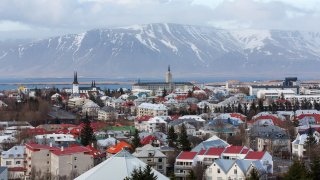
A long-running trial of a shorter working week in Iceland has been hailed an "overwhelming success," as the vast majority of the country's workers have since secured contracts to shorten their hours.
A report analyzing the impact of the trial found that by June 2021 some 170,200 union members from Iceland's working population of 196,700 were now covered by shorter working hour contracts.
This means that 86% of workers were now either on shorter hour contracts or had "new mechanisms made available to them through which they can negotiate shorter hours in their workplace," according the report, published Sunday by think tank Autonomy and research organization Association for Sustainability and Democracy (Alda) in Iceland.
Iceland ran two large-scale trials between 2015-19, cutting working weeks to between 35 and 36 hours from a 40 hour-week for many, with no reduction in pay. The trials, which eventually included 2,500 workers, were initiated by the council in the Icelandic capital of Reykjavik and the country's national government.
The trials included normal 9-5 workers, as well as those on non-standard shift patterns, and took place in a range of workplaces such as offices, playschools, social service providers and hospitals.
Following the trial, Icelandic trade unions and their confederations secured permanent reductions in working hours for tens of thousands of members across the country.
Autonomy and Alda's analysis of the results found that a reduction of working hours actually maintained or increased productivity.
Money Report
Will Stronge, director of research at Autonomy, said the study showed that the "world's largest ever trial of a shorter working week in the public sector was by all measures an overwhelming success."
"It shows that the public sector is ripe for being a pioneer of shorter working weeks — and lessons can be learned for other governments," he said.
Get a weekly recap of the latest San Francisco Bay Area housing news. Sign up for NBC Bay Area’s Housing Deconstructed newsletter.
Data was collected throughout the trials, measuring indicators such as wellbeing, performance and work-life balance.
The findings indicated an improved wellbeing and work-life balance among workers, as people found it easier to do household errands and make more time for themselves, for example. The report also noted that men took on more responsibilities around the house after the trial started, which helped to reduce stress at home.
Autonomy and Alda said in their report that the "ability to draw on evidence from existing trials of a 'four-day week' or similar schemes will become increasingly important for supportive workers, organisations and politicians."
Indeed, Spain is set to trial a four-day week, while other countries such as Japan, New Zealand and Finland have also shown interest in the concept.
Check out: Americans are booking longer vacations this year—here’s how to save money on an extended trip






